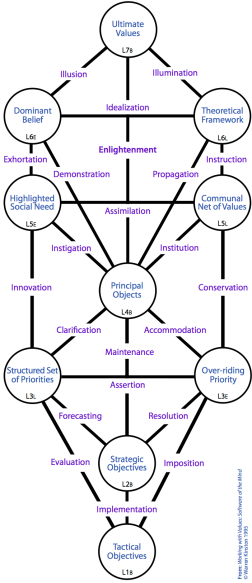Answers to «The Purpose/Meaning of Life»
The THEE Advantage
as a THEE entity must be about «the enduring meaning you are giving to your life». This is a practical, subjective question, because you cannot avoid assigning meaning to your life—even a rejection of meaning is a meaning, just as refusing to make an existential choice is an existential choice.
The are existential and integral to the human condition. As such, they are universal: transcending both time and culture.
In regard to other thinkers, my difference (or advantage) is starting from empty cells in a given pattern within a Taxonomy. I know that each cell has to correspond to something. But what? My mind started, if not totally empty, then open but channeled.
Philosophers, psychologists and other thinkers start in a totally different place. Their minds are full: they have the history of their discipline at their fingertips, often colleagues looking over their shoulder, reputation at risk, and sometimes a fierce urge to communicate something welling up from within themselves.
Some writers propose, in a considered and reasonable way, what should/could be «the meaning of life» for everyone. On the World Wide Web at the time of posting, it seems that this sort of passionate promotion outweighs balanced reviews of alternatives.
Philosophical debate lies outside the scope of the Taxonomy. But it is safe to say that are definitely not about «the one meaning of life for everyone».
![]()
Categorizing Standard Answers
My Internet review of «purpose of life», «meaning of life» and «pursuit of happiness» generated many different suggestions. You can check out views here![]() and here
and here![]() and here
and here![]() and elsewhere. The variety is great. No-one, to my knowledge, expects or assumes a set of Types that would fit within THEE's Root Typology.
and elsewhere. The variety is great. No-one, to my knowledge, expects or assumes a set of Types that would fit within THEE's Root Typology.
Here is a rough-and-ready classification of what I found:
●
E.g. find someone, settle down and raise a family; make a good living; become a leader in your community; build a valuable business. These are that entail work. The appropriate location is in the as explained elsewhere when discussing the Human Condition![]() .
.
●
E.g. make money, get out more, do exercise, take a holiday, spend more time with your family, find a hobby. These are offered by advisors who look skeptically at ethical or imaginative possibilities. The advice appeals because of its immediacy, necessity, enjoyment and natural feel.
●
E.g. organize good experiences; get deliverance from suffering (i.e. fear of life) &/or handle the fear of death; seek wisdom or truth; become a better person or a «truly good» person; stop trying so hard and be content; get more power or feel your power; happiness as a project; realize your potential (or self-actualization); Journey of the Hero; integrating archetypes.
●
E.g. adherence to commandments in holy texts, spiritual enlightenment, acting in accord with traditional customs, praying and turning to God, living a pious life, experiencing divine bliss.
●
E.g. Love, Justice, Freedom, Truth, Beauty, Peace, Devotion, Goodwill, Happiness, Meaning. are eternally pursued inner experiences (or states of being) so linking them to happiness would be natural. More details: via the toggler below or see Working with Values Ch.4.
![]() Happiness and Meaning as Values
Happiness and Meaning as Values
●
E.g. doing good, acting kindly, using your talents, working off karma, showing gratitude. These are that underpin virtuous living. See more on in Working with Values Ch.8. Rules are found in , and like , are primarily a context for endeavour.
●
The importance of identity is a feature of all taxonomic frameworks, and the deep wish to maintain identity is repeatedly discovered and proclaimed in semi-academic and popular texts. Almost any identity could be selected, however, in the area of :
- the search for love is a feature of ()
- the search for respect is a feature of ().
●
E.g. just living, engaging in life, having experiences, coming to your own conclusions, instinctual activity especially procreation. The underlying notion varies: e.g. ●everyone is unique; ●you get what you deserve. ![]() Comment ►
Comment ►
●
E.g. pithy sayings, proverbs, specific beliefs, specific value systems. These are often in collections or essays. They are often inspiring or wise, but some are cynical or superior.
-
Confused? No wonder. Start on the inquiry now.
OR
- Examine two common topics that contrast with the : the hero's journey, and use of archetypes.
Originally posted: 18-May-2012
